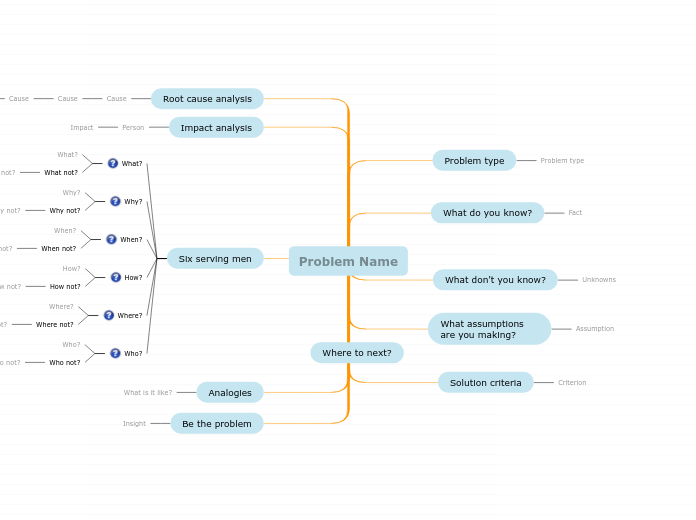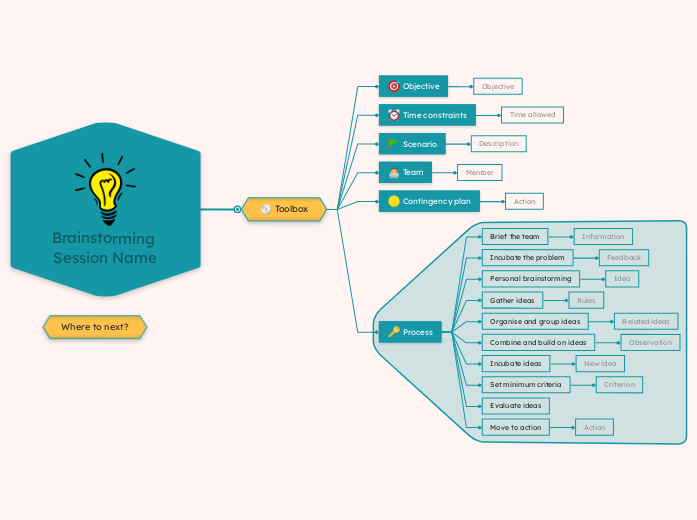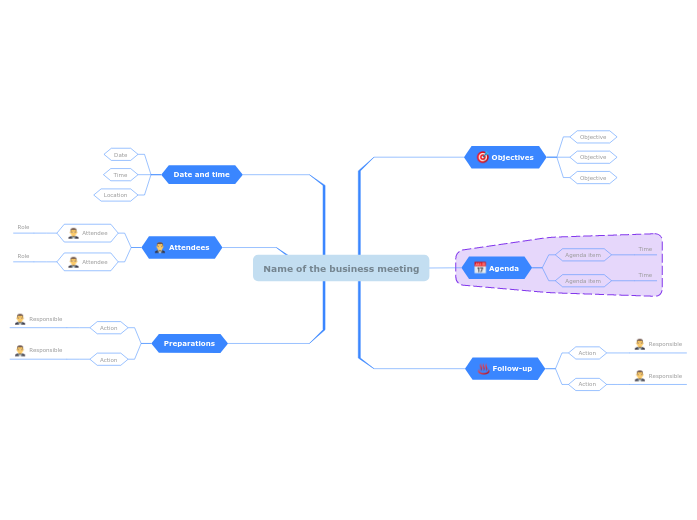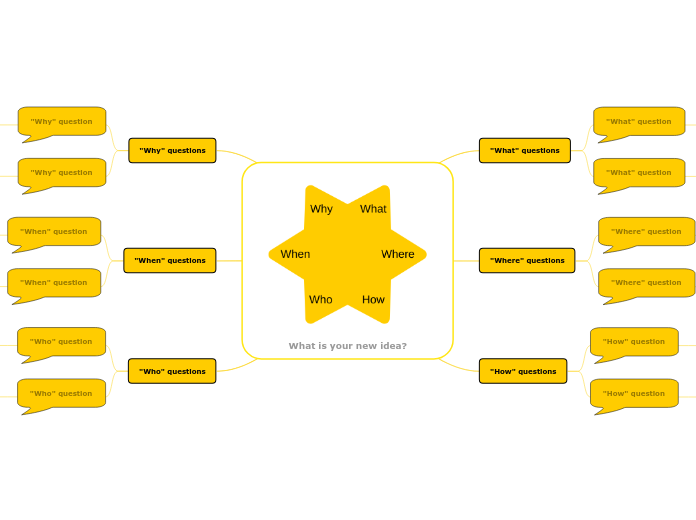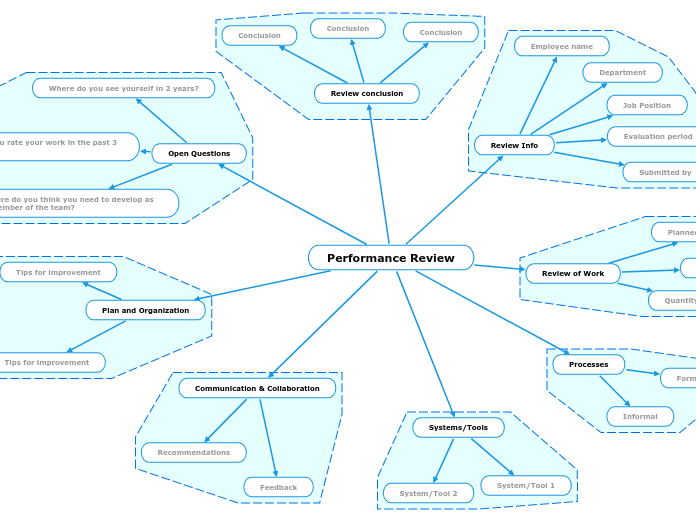Problem analysis template
Enter your problem's name and categorize it, whether you want to sort something out, create or just change something. Identify all the information you know as well as the one you don't know about it: include measurements, statistics, surveys or any known data together with uncertain or missing information, anything that will help you frame the entire difficulty.
Specify the suppositions you make and think of results in case your presumptions are not valid. Give at least as much importance to the final outcome of a problem, as to the problem state itself.
Try out the impersonation technique and be the problem as if it were a person. Once you do this, observe if anything changes, how things are perceived from this perspective, what are the opportunities and obstacles from this approach?
Apply the problem analysis method 'Six serving men' and answer openly to each of the six essential questions, both positive and negative to better track the triggers and the situations when the problem manifests itself.
The problem description toolbox goes hand in hand with the 5 Whys approach, so include it in the problem's final assessment and go to the root cause of the original issue.
Where to next?
Where to next?
When you have a comprehensive description of the problem, you can move towards finding solutions.
Consider brainstorming as a next step or Share the mind map with your colleagues.
Problem Name
Name the problem
Identify the problem or issue in a few words and press Enter. This will become the title of your map.
Be the problem
Insight
Add a statement describing the problem as if it were a person.
- What does the world look like from the problem's perspective?
- How does it respond in certain situations?
- What does it like or not like?
- What weaknesses does it look for in people or situations?
- What weaknesses does it have that make it vulnerable?
- How does it help other people and support their goals?
Analogies
What is it like?
What is 'Problem Name' like?
- Have similar problems or similar causes been seen in other places?
- What would it look like if you imagined the same problem in a completely different situation?
For example, how would the problem behave at a wedding, at a concert, in a supermarket, or underwater?
Six serving men
Who?
Who not?
Who does not cause 'Problem Name'?
- Are there people or users who manage to avoid this problem?
- Are they doing something different to everyone else?
Who causes 'Problem Name'?
- Is there any connection with certain people or users?
- Are they doing something different to everyone else?
Where?
Where not?
Where does 'Problem Name' not happen?
- Are there locations or places where the problem does not happen?
- Are there locations where it should happen but doesn't?
Where does 'Problem Name' happen?
- Is there any connection with locations or places?
How?
How not?
How does 'Problem Name' not happen?
- How do you know when the problem is not happening?
- Could the problem actually not be happening, when you think it is?
- Is it really there all the time?
How does 'Problem Name' happen?
- How does the problem appear?
- How do you know the problems is happening?
- Could it be happening when you are not aware of it?
When?
When not?
When does 'Problem Name' not happen?
- Are there times when this problem does not happen?
- Are there times when according to theory, it should happen, but it doesn't?
- If it is intermittent, when does it start working again?
When does 'Problem Name' happen?
- Is there any connection with dates, times or other events?
- Is it something that was working once, and has stopped working?
Why?
Why not?
Why is 'Problem Name' not a problem?
- Are there times when this situation occurs, but it is not a problem?
Why is 'Problem Name' a problem?
What?
What not?
What does not cause 'Problem Name'?
- What does not trigger this problem?
- Are there situations or conditions that might be expected to cause it, but don't?
What causes 'Problem Name'?
- What causes or triggers this problem?
- Are there situations or conditions that are not expected to cause it, but do somehow?
Impact analysis
Person
Who is affected?
Type in a name or role of someone who is affected by 'Problem Name'
Impact
How is Person affected by 'Problem Name'?
- What are the symptoms?
- What do they have to do when encountering the problem?
- Could they provide more information?
- Could they try doing things differently?
Rate the impact by clicking an icon:
High impact - significant consequences
Medium impact - annoying but tolerable
Low impact - negligible effect
Root cause analysis
Root Cause analysis
For analytical problems, root cause analysis can help to unravel indirect causes of problems, leading to more effective solutions. One way to do this is to keep asking 'Why?' down to five levels, to understand the reasons behind the reasons.
Cause
Why does 'Problem Name' happen?
Enter a reason that 'Problem Name' happens.
Why does 'Cause' happen?
Enter a reason that 'Cause' happens.
(Level 2 of 5)
Why does 'Cause' happen?
Enter a reason that 'Cause' happens.
(Level 3 of 5)
Why does 'Cause' happen?
Enter a reason that 'Cause' happens.
(Level 4 of 5)
Why does 'Cause' happen?
Enter a reason that 'Cause' happens.
(Level 5 of 5)
Solution criteria
Criterion
Add solution criteria
Make sure you consider:
- Minimum acceptable success criteria
- Meeting constraints on solutions, e.g. cost, time, resources
- Ensuring that the symptoms will disappear
- Resolving the impact on various users
- Addressing the root causes
- Validating the solution against known data
What assumptions are you making?
Assumption
Add an assumption
Identify an assumption you are making in both the description of the problem and the logical solution.
- What would happen if the assumption changed?
- What if the assumption is not valid?
- Might different assumptions also apply?
What don't you know?
Unknowns
Add an unknown factor
Identify information or data that is not known or not reliable, and what you can do to find it. Think about:
- Missing information
- Information that could be unreliable
- Information from reliable sources that is factually wrong
- Other people who might have useful information or experience
What do you know?
Fact
Add a piece of data
Add data or a reference to the problem. Think about:
- Measurements and samples
- Statistics and trends
- Surveys
- Symptoms, documented evidence and verbal stories
- Possibly related incidents or symptoms
Problem type
Describe the problem type
Select the problem type or enter your own description.
Create something newChange somethingFix something broken
